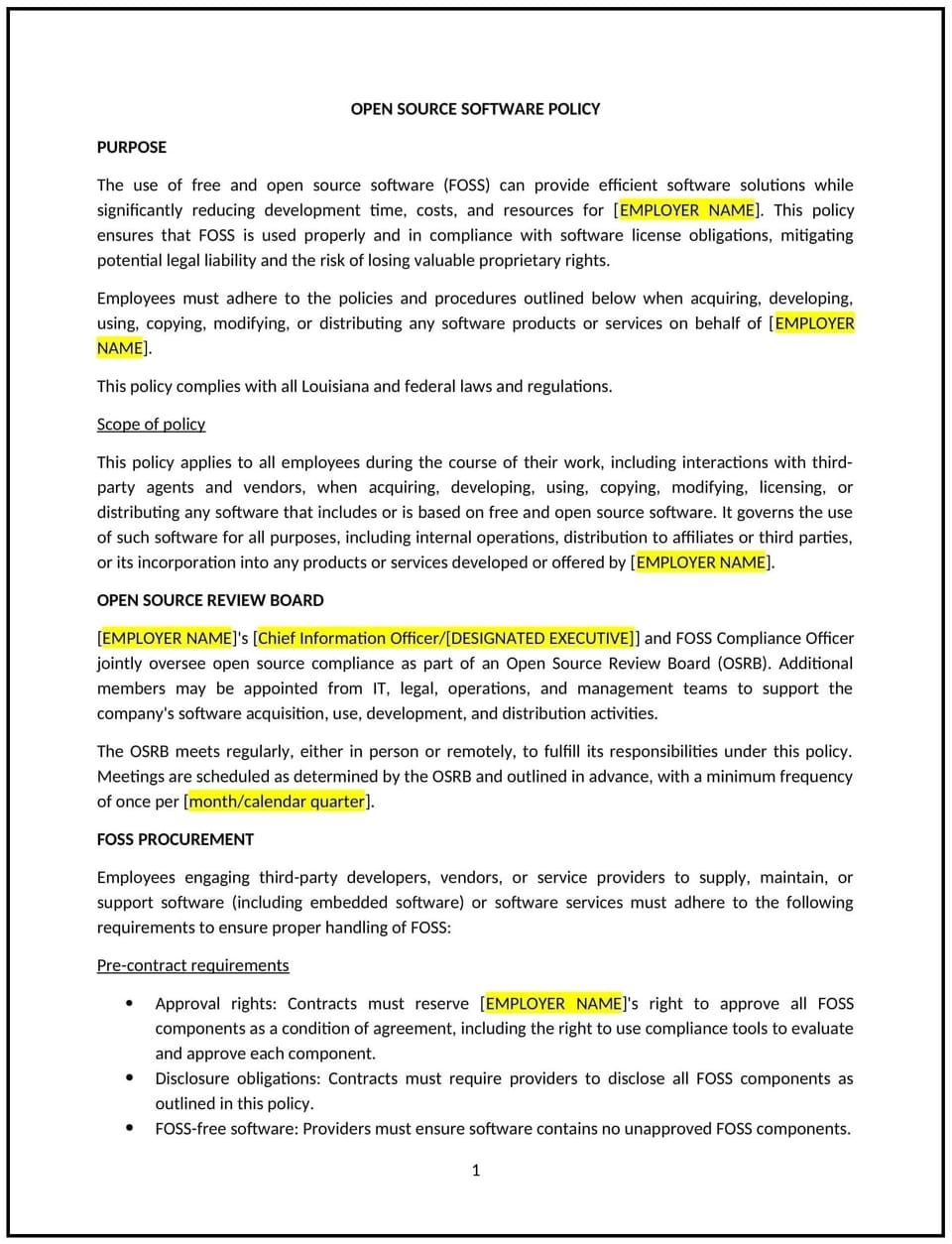Open source software policy (Louisiana): Free template

Open source software policy (Louisiana)
This open source software (OSS) policy is designed to help Louisiana businesses establish guidelines for using, contributing to, and managing open source software. It outlines processes to ensure responsible usage, minimize risks, and promote collaboration while protecting company interests.
By implementing this policy, businesses can encourage innovation, manage compliance with licensing obligations, and mitigate security vulnerabilities.
How to use this open source software policy (Louisiana)
- Define open source software: Clearly describe OSS and its use in business operations, including examples of acceptable and prohibited uses.
- Outline approval processes: Specify steps for evaluating and approving OSS before integration into company projects.
- Address licensing requirements: Provide guidelines for understanding and adhering to OSS license terms, such as GPL or MIT licenses.
- Include contribution guidelines: Outline procedures for employees contributing to OSS projects, including obtaining necessary approvals.
- Establish security protocols: Detail how OSS will be scanned for vulnerabilities and monitored for updates.
- Communicate responsibilities: Clarify the roles of employees, developers, and IT teams in managing OSS usage and contributions.
Benefits of using an open source software policy (Louisiana)
Implementing this policy provides several advantages for Louisiana businesses:
- Encourages innovation: Leverages OSS to enhance development efficiency and creativity.
- Reduces risks: Minimizes legal, security, and operational issues associated with improper OSS usage.
- Promotes collaboration: Supports employee contributions to OSS communities while protecting business interests.
- Clarifies expectations: Provides clear guidelines for using and managing OSS responsibly.
- Reflects Louisiana-specific considerations: Adapts to local business needs and technological practices.
Tips for using this open source software policy (Louisiana)
- Train employees: Provide guidance on OSS licensing, contribution guidelines, and security best practices.
- Evaluate dependencies: Regularly assess OSS dependencies for security risks and compatibility with company systems.
- Maintain documentation: Track all OSS used in company projects, including versions, licenses, and approval records.
- Monitor updates: Ensure OSS is regularly updated to address vulnerabilities and maintain functionality.
- Review contributions: Require employees to seek approval before contributing company-developed code to OSS projects.
Q: What is considered open source software under this policy?
A: Open source software includes programs and libraries distributed under licenses that allow access to source code for modification and redistribution.
Q: How should employees seek approval for using OSS in company projects?
A: Employees should submit a request to their manager or IT team, including details about the OSS, its intended use, and licensing terms.
Q: Can employees contribute to open source projects using company resources?
A: Employees may contribute to OSS projects with prior approval, ensuring contributions do not conflict with company interests or proprietary code.
Q: What security measures should businesses implement for OSS?
A: Businesses should scan OSS for vulnerabilities, apply updates regularly, and monitor dependencies for potential risks.
Q: What are the common licensing terms employees should understand?
A: Employees should be familiar with terms like copyleft (e.g., GPL), permissive licenses (e.g., MIT), and obligations such as attribution or source code sharing.
Q: How often should this policy be reviewed?
A: The policy should be reviewed annually or when significant changes occur in OSS usage, licensing, or security practices.
Q: What documentation is required for OSS used in company projects?
A: Documentation should include the name of the OSS, version, license type, approval records, and details of its integration into projects.
This article contains general legal information and does not contain legal advice. Cobrief is not a law firm or a substitute for an attorney or law firm. The law is complex and changes often. For legal advice, please ask a lawyer.


